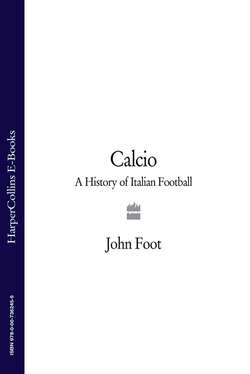Читать книгу Calcio: A History of Italian Football - John Foot - Страница 26
The first ‘theft’. Bologna, Genoa and the 1925 playoff final
ОглавлениеIn 1925, as Italy teetered on the brink of absolute dictatorship, fascism made its first, direct intervention into the football world. Leandro Arpinati had been the local leader of the fascist squads who roamed the Bolognese countryside and city in the post-war period. Using batons, guns and castor oil, these gangs wrought havoc as they ‘brought order’ to a socialist region. With the ascent of the fascists to power and the progressive move towards dictatorship the violence was toned down. It was no longer needed. Most people were too scared to protest, or had fled.
The 1924–25 season witnessed a titanic struggle between Bologna – Arpinati’s team – and Genoa. There were no penalty shoot-outs, so drawn games were simply replayed. Five playoffs were needed to decide the fate of the championship. The third game in this series – played in Milan on 7 June 1925 – proved to be the most dramatic and controversial match in the short history of calcio. A massive crowd of some 20,000 fans turned up, including Arpinati himself, and many threatened to spill onto the pitch. Giovanni Mauro, lawyer and ex-player for both Inter and Milan, was the referee. One of the most authoritative figures in the game, he had been an influential member of various committees for over ten years, whilst continuing to officiate in important matches.
William Garbutt’s Genoa were 2–0 up by half-time and the title seemed theirs. Midway through the second half, Bologna were on the attack when a close-range shot came in towards the Genoa goal. The goalkeeper spread himself, and Mauro gave a corner to Bologna. At that point, there was a pitch invasion, led by a group of black-shirted fascists. Arpinati stayed in the stands. The referee was surrounded for at least fifteen minutes. In the end – scared, it is said – he changed his decision and gave a goal. Bologna then ‘equalized’ with eight minutes left, but Genoa refused to accept the draw and play extra-time. Under federation rules, after the pitch invasion the game (and therefore the championship) should have been awarded to Genoa. However, Mauro, under pressure from Arpinati, wrote a bland report which mentioned the pitch invasion, but assigned no blame for it. The federation ordered yet another playoff.
The fourth final was played in Turin on 5 July, and ended in another draw. Genoa and Bologna fans clashed at the city’s Porta Nuova station after the game, and gunshots were fired from the Bologna train. Most reports mention either two or four shots, but some put the number as high as twenty, and the fascist daily paper at the time wrote of ‘quite a few revolver rounds’. At least two Genoa fans were injured, and one was taken to hospital. Bologna received a small fine, but the incidents caused national outrage, a long inquiry by the federation and a debate in Parliament. The federation decided on yet another game in Turin – this time with no crowd. However, the city’s authorities refused to give permission for the match to take place.32 Football had become a public-order problem.
The drama came to an end in August with a game behind closed doors on the outskirts of Milan at 7.30 in the morning. More than a month had passed since the violent events of Turin, and more than two months since the bizarre ‘no-goal’ game in Milan. Most of the Genoa team were called back from their holidays to play. The press was ordered to keep the location of the game secret, or to pretend it was in Turin. In the ‘crowd’ there were a few journalists, some club officials and assorted locals. The whole pitch was surrounded by carabinieri on horseback. Bologna won, 2–0, despite having one man sent off just four minutes into the second half, and another towards the end for ‘insulting his opponents after a goal’.
Bologna’s all-Italian team duly won their first championship, the national playoff with the southern champions being the usual formality, but in Genoa and elsewhere this success would always be known as ‘the great theft’. As film-maker Giuliano Montaldo wrote in the 1990s, ‘It is hard to believe now but before the war this was the main talking point at the Marassi [Genoa’s ground]. The wound has only been healed in the last twenty years. Before that, when we said “Bologna” we meant “the thieves”.’ The sense of injustice was exacerbated by the rest of the club’s history as Genoa were never to win another scudetto. The team was thus denied its tenth championship, an honour that gives clubs the right to sew a special star on their shirts. Inter and Milan currently have one star and Juventus have two.33 Genoa have never got close to their star again and have been stuck on nine championships for eighty years. As is to be expected, Bologna’s version of events is rather different. Fan websites hint at a ‘hole in the goal net’ which would explain the events of that day and leave us in doubt as to whether their team had actually scored, whilst Mauro’s report is glossed over and the pitch invasion is blamed on both sets of fans. This version remains limited to one category of people – Bologna supporters.
In 1925, Bologna’s powerful backers decided which version of events was made public. In 1926 Arpinati was appointed as the new podestà – unelected Mayor – of the city and in the same year he became president of the Italian football federation, a job he would hold until 1933. He reigned supreme over football, his club and his city until financial scandal brought him down in 1934.34
